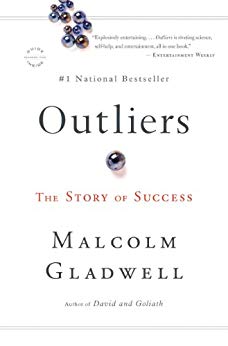

This article is an excerpt from the Shortform summary of "Outliers" by Malcolm Gladwell. Shortform has the world's best summaries of books you should be reading.
Like this article? Sign up for a free trial here .
What is the key determinant of success in life? Is it hard work? Genetics? Privilege?
According to Malcolm Gladwell, success is impossible without the opportunity to become successful no matter how hard you work. Furthermore, Gladwell writes that people who get opportunities early in life have a huge advantage over those whose opportunities come later in life.
Here’s why earlier opportunities are more impactful.
Opportunity Is Key to Success
According to Malcolm Gladwell, success is the product of opportunity. While a person’s individual attributes—like talent and work ethic—may determine their potential, Gladwell asserts that external factors determine who has the opportunity to reach their potential, and who faces roadblocks. In other words, it’s impossible to achieve success if you don’t have the chance to put your skills to work.
Furthermore, early opportunities are better than opportunities that become available later in life because of early opportunities:
- Create self-fulfilling prophecies
- Benefit from an accumulative advantage.
| Seemingly Minor Aspects of Upbringing Can Have Big Impacts In addition to the benefits that Gladwell describes, your childhood experiences and environment have an outsize impact on your life trajectory because they shape your foundation as a person—they can endow you with valuable tools or burden you with additional challenges. Research shows that the ways in which your upbringing impacts your trajectory in life can be physiological or psychological, and often unexpected. For instance – If you grew up watching your parents work out arguments collaboratively and constructively, you’re more likely to have high self-esteem, strong social skills, emotional security, and solid academic performance. – Kids of high-income parents have higher SAT scores than their low-income peers. – If you grew up in a low-income household, you’ll have a lower working memory—which lets you hold multiple ideas in your head at once—as an adult. – If you’re the son of a working mother, there’s a greater chance you’ll spend more time taking care of your kids and contributing to housework as an adult. – If you’re the daughter of a working mother, you’re more likely to work in a management position and make more money than daughters of stay-at-home moms. |
Advantage #1: Self-Fulfilling Prophecies
Gladwell states that children who are taught (directly or indirectly) that they’re gifted, talented, or smart tend to live up to that expectation. They believe that they are talented and therefore act like they are talented, which leads to them developing actual talent. This is a self-fulfilling prophecy, meaning that belief influences reality.
Likewise, children who are told that they’re unintelligent or unremarkable tend to believe and embody that description.
| Nuances of Self-Fulfilling Prophecies In Mindset, psychologist Carol S. Dweck describes how self-fulfilling prophecy has a substantial impact on children—and some of her findings may be surprising. Paradoxically, Dweck’s research revealed that children who are praised for being smart tend to shy away from difficult tasks, rather than rising to the challenge. These children want to uphold their reputation for being smart, so they avoid doing anything that risks failure, for fear of showing shortcomings in their intelligence. Dweck concluded that this reaction comes from a fixed mindset, a belief that abilities (like intelligence) are unchangeable; when you view your abilities as unchangeable, you feel you must constantly prove yourself. By contrast, a growth mindset is based on the belief that the abilities you’re born with are a starting point, which prompts you to work hard, seek challenges that stretch you, and welcome mistakes as opportunities to learn. The two different mindsets dictate people’s aspirations and how they approach success, failure, and effort. In sum, this type of self-fulfilling prophecy depends on whether parents praise children for their talent (fixed mindset) or their effort (growth mindset). |
Advantage #2: Accumulative Advantage
In addition to self-fulfilling prophecies, Gladwell writes that early opportunities lead to more opportunities, creating a snowball effect. In other words, the benefits of one small advantage compound over time to create exponentially greater success. This is called accumulative advantage, or the Matthew effect. By the same token, the Matthew effect also describes how small disadvantages tend to snowball into larger ones.
(Shortform note: This principle is also called cumulative advantage, which sociologist Robert Merton coined in 1968 when he described how scientists who are already well-known often receive more credit than their co-authors in group studies. The term “Matthew effect” refers to a Bible verse in the book of Matthew: “For to everyone who has, more will be given, and he will have abundance; but from him who does not have, even what he has will be taken away.”)
For example, consider how one opportunity changes the trajectories of two young girls who want to be professional actors. The first girl gets the lead role in her middle school play, which sets off a series of events:
- As the show’s star, she gets more coaching from the director than the other student actors, which helps her develop her skills and confidence. Additionally, as the lead, she has to play a broader range of emotions, and that gives her a chance to put her talent on display.
- That role puts her in a better position to get the lead in her high school plays.
- Those roles make her more visible to college recruits, raising her chances of getting an acting scholarship with a reputable program.
- Her college experience increases her odds of successfully pursuing an acting career.
The second girl gets a minor role in her middle school play. As a result:
- Her acting skills and confidence develop more slowly, and her talents are hardly noticeable since she has only a few lines.
- She continues to land smaller roles through high school.
- She studies acting in college, but she struggles to stand out among her classmates. She starts to have second thoughts about the viability of an acting career, so she shifts some of her focus to studying business as a backup plan.
- She doesn’t have the skills to land well-paid gigs right out of college, and she doesn’t have the confidence that she’ll make it before she goes broke, so she falls back on a business career.
| Accumulative Advantage Isn’t Absolute Research shows that the concept of accumulative advantage applies to many areas of life, including education, social influence, wealth distribution, and network science. However, the reality is more complex than the model suggests; for example, if the rich got endlessly richer, and the poor endlessly poorer, then there would be more trillionaires and more people in hopelessly desperate conditions. In The Matthew Effect, sociologist David Rigney argues that, in reality, there are six ways things play out between the fates of the haves and the have-nots. Three scenarios cause the gap between haves and have-nots to widen: 1. The haves rise; the have-nots fall. (This is called the “absolute Matthew effect.”) 2. The haves rise; the have-nots rise at a slower pace. (This is called the “relative Matthew effect.”) 3. The haves fall; the have-nots fall at a faster pace. In the other three scenarios, the gap between them narrows: 4. The haves fall; the have-nots fall at a slower pace. 5. The haves rise; the have-nots rise at a faster pace. 6. The haves fall; the have-nots rise. Rigney concedes that, often, one of the first three scenarios plays out and the gap widens between the advantaged and the disadvantaged. |
———End of Preview———

Like what you just read? Read the rest of the world's best summary of "Outliers" at Shortform . Learn the book's critical concepts in 20 minutes or less .
Here's what you'll find in our full Outliers summary :
- What makes some people outliers, and most others not
- Why some genius outliers end up failing in life
- Why Asians are good at math, and other curiosities of culture






